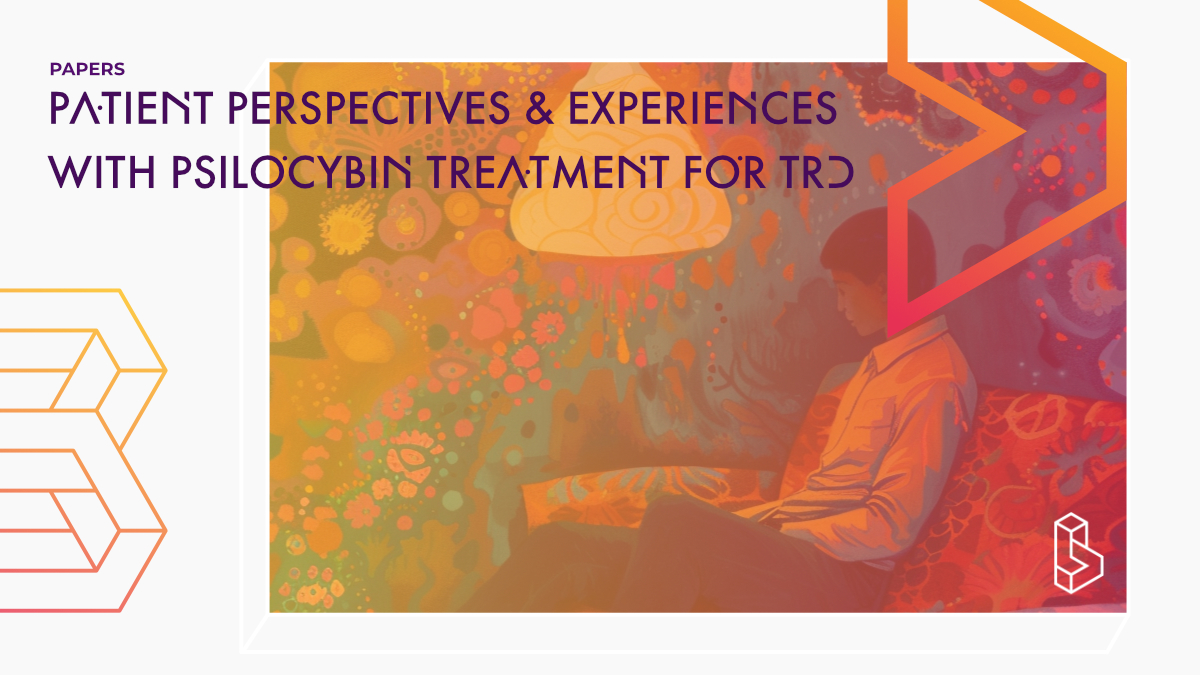This qualitative study (n=11) explores the experiences of treatment-resistant depression (TRD) patients undergoing a double-blind, randomized clinical trial with a single session of oral psilocybin treatment (1, 10, or 25 mg). Three major themes emerged: trust-building and expectation management challenges, navigating the experience, and the need for a more comprehensive treatment. Subthemes included distrust in mental healthcare, managing expectations, profound experiences during the session, and a desire for multiple psilocybin sessions. Insights from patients’ perspectives suggest strategies for optimizing psilocybin treatment for TRD, such as individualized preparation, trust-building, additional sessions, and personalized therapy approaches.
Abstract of Patient perspectives and experiences with psilocybin treatment for treatment-resistant depression: a qualitative study
“Psilocybin is the most researched classic psychedelic for Treatment-Resistant Depression (TRD). While optimizing set and setting are considered essential for efficacy and safety, patient perspectives on these aspects have rarely been investigated. To address this knowledge gap, the current paper explored the experiences of 11 TRD patients (8 women, 3 men) participating in a double-blind randomized clinical trial with a single session of oral (1, 10 or 25 mg) psilocybin treatment. After qualitative analysis, three major themes were identified: (1) challenges with trust-building and expectation management; (2) navigating the experience; and (3) the need for a more comprehensive treatment. Subthemes of the first theme include a general distrust in mental healthcare, trust in study therapists, limited time for preparation, and managing expectations. The second theme included the following subthemes: trusting to surrender, profound and overwhelming experiences, and music as a guide. The third theme addressed a desire for multiple psilocybin sessions, and challenges with sensemaking. Patients’ perspectives provided important insights into potential optimization of psilocybin treatment of TRD, including individualized preparation, investment in trust-building, offering additional psilocybin sessions, providing access to sustained (psycho)therapy with trusted therapists, and personalizing treatment approaches, which may also enhance real-world adaption of these treatments.”
Authors: Joost J. Breeksema, Alistair Niemeijer, Erwin Krediet, Tilman Karsten, Jeanine Kamphuis, Eric Vermetten, Wim van den Brink & Robert Schoevers
Summary of Patient perspectives and experiences with psilocybin treatment for treatment-resistant depression: a qualitative study
Psilocybin is the most studied classic psychedelic, and has shown to significantly and rapidly decrease depressive symptoms with moderate effect sizes shortly after and in the week(s) following the intervention. Two longer-term follow-up studies have found improvements in mood for a substantial proportion of patients six17 to twelve18 months after the last psilocybin session.
Researchers conducted a qualitative study with 19 patients who had participated in a double-blind, randomized, controlled dose-finding trial with a single dose of oral psilocybin (10 or 25 mg) or active placebo (1 mg). The study explored patients’ expectations and experiences with psilocybin and the influence of contextual factors.
Results
Find this paper
https://doi.org/10.1038/s41598-024-53188-9
Open Access | Google Scholar | Backup | 🕊
Cite this paper (APA)
Breeksema, J.J., Niemeijer, A., Krediet, E. et al. Patient perspectives and experiences with psilocybin treatment for treatment-resistant depression: a qualitative study. Sci Rep 14, 2929 (2024). https://doi.org/10.1038/s41598-024-53188-9
Study details
Compounds studied
Psilocybin
Topics studied
Treatment-Resistant Depression
Depression
Study characteristics
Original Re-analysis
Follow-up
Interviews
Qualitative
Participants
11
Humans
Compound Details
The psychedelics given at which dose and how many times
Psilocybin 1 - 25mg | 1x
Linked Research Papers
Notable research papers that build on or are influenced by this paper
Single-Dose Psilocybin for a Treatment-Resistant Episode of Major DepressionThis double-blind active-placebo controlled trial (n=233) tested the effect of a single dose of psilocybin (25/10/1mg) with supportive therapy for treatment-resistant depression. The primary endpoint at three weeks finds a significant reduction in depressive symptoms (MADRS, 12-point drop from baseline of 32) that was significantly greater in the 25mg group vs the 1mg (placebo) group (6.6 points larger drop). The response (>50% drop in MADRS score) in the 25mg group dropped from 37% at 3 weeks to 20% at 12 weeks.
Linked Clinical Trial
The Safety and Efficacy of Psilocybin in Participants With Treatment Resistant DepressionThe Safety and Efficacy of Psilocybin in Participants with Treatment Resistant Depression - a dose-ranging study.

